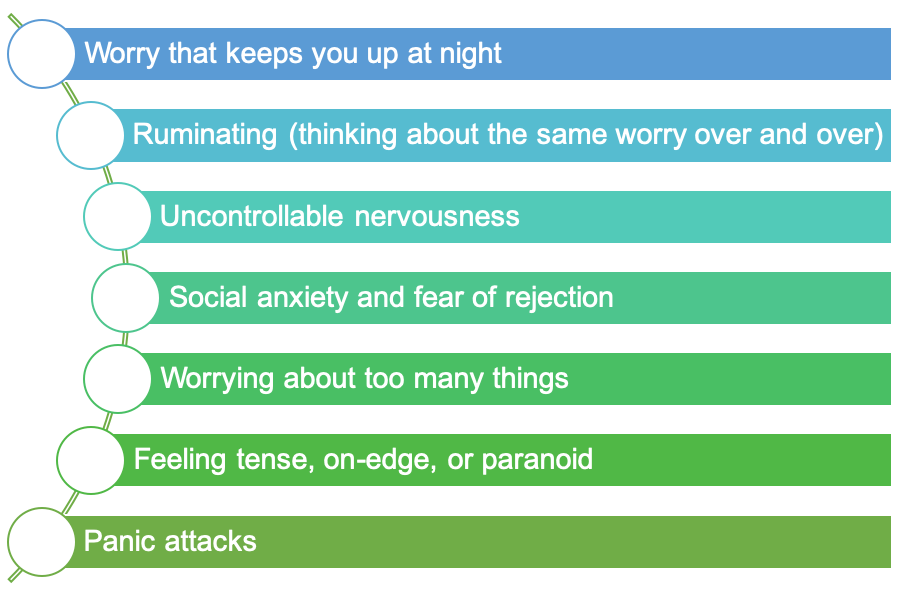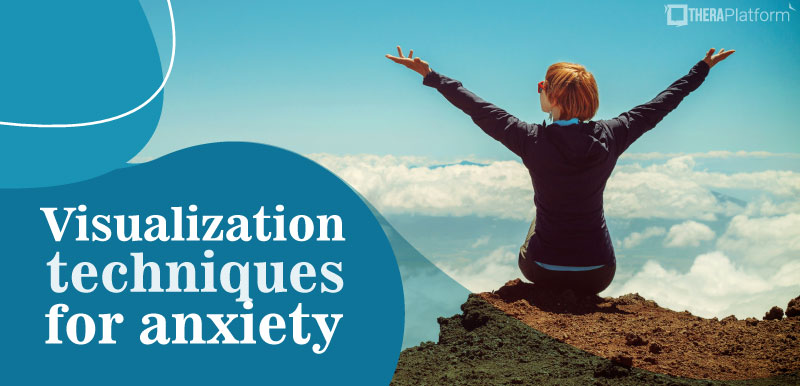Counselling for anxiety disorder: Custom sessions designed for your situation
Wiki Article
Exploring Various Techniques in Coaching for Anxiety Problem for Long-term Change
When taking on anxiousness problems, it's vital to discover a selection of therapy techniques. Each technique uses unique insights and devices to help you handle your signs and symptoms successfully. You could discover that incorporating methods can yield the ideal outcomes. Recognizing the nuances of these approaches is key to cultivating long lasting change. What if the right combination could launch a brand-new level of emotional well-being for you?Understanding Anxiousness Problems: A Short Overview
Stress and anxiety disorders, which influence millions of people worldwide, can greatly impact day-to-day live. You might experience overwhelming sensations of worry or stress that appear irrepressible. These sensations can result in physical signs and symptoms like an auto racing heart, sweating, or perhaps lightheadedness. Common kinds of anxiety conditions include generalized stress and anxiety disorder, panic disorder, and social anxiousness problem. Each has special signs, yet they all share a propensity to disrupt your regular and relationships.Understanding the origin triggers of your anxiousness is crucial. It might stem from genetics, brain chemistry, or life experiences. Identifying your triggers can assist you manage your reactions better. It is essential to keep in mind that you're not the only one in this battle. Lots of people face comparable obstacles, and seeking assistance is a strong action towards feeling much better. By learning more about anxiety conditions, you're already on the course to understanding and managing your problem extra properly.Cognitive-Behavioral Treatment: Testing Adverse Idea Patterns
In Cognitive-Behavioral Therapy, you'll begin by recognizing the unfavorable thought sets off that add to your anxiety. Counseling services for anxiety. You'll work on changing them with even more positive options once you identify these thoughts. With each other, you'll construct efficient coping methods to help manage your anxiousness in day-to-day scenarios
Identifying Negative Idea Triggers
Acknowledging the specific triggers behind your unfavorable thoughts can be vital in managing anxiousness when you experience moments of distress. Begin by taking note of circumstances that provoke sensations of fear or anxiety. Is it a congested area, a future deadline, or a discussion with specific people? Write down these circumstances in a journal. This will help you recognize patterns in your thinking. Likewise, notification physical experiences that accompany your negative thoughts, like an auto racing heart or rigidity in your chest. By identifying these triggers, you obtain understanding right into what's fueling your anxiety. Recognizing these connections is the very first step in testing those ideas and ultimately regaining control over your emotional responses.Replacing Ideas With Positives
Challenging negative idea patterns is an essential action in changing your way of thinking and minimizing stress and anxiety. You may typically find on your own trapped in cycles of self-doubt or devastating thinking. Rather than letting these ideas dictate your feelings, practice replacing them with practical alternatives or favorable affirmations. For instance, when you believe, "I can't handle this," change it to, "I can manage challenges one step at once." This basic change can significantly impact your emotional state. On a regular basis identifying and responding to these unfavorable ideas assists create a healthier interior discussion. Bear in mind, it takes some time and effort, yet regularly practicing this method can result in long-term adjustment, empowering you to face anxiety with restored self-confidence and durability.Building Coping Approaches Together

Mindfulness and Acceptance-Based Approaches: Cultivating Present-Moment Awareness
As you navigate the complexities of anxiety, incorporating mindfulness and acceptance-based strategies can substantially improve your ability to grow present-moment awareness. By concentrating on the here and currently, you'll discover that you can observe your thoughts and feelings without judgment. This technique helps you acknowledge your anxiousness without feeling bewildered by it.Engaging in mindfulness workouts, such as deep breathing, body scans, or led reflections, permits you to ground on your own in your present experience. Acceptance-based approaches encourage you to embrace your emotions instead than deal with versus them. When you accept your sensations, they shed their power over you.Incorporating these techniques into your daily routine can transform exactly how you respond to stress and anxiety. You'll establish resilience and find out to browse demanding scenarios with better simplicity. Ultimately, cultivating present-moment understanding lays the foundation for long-term change, equipping you to lead a more meeting life.Direct Exposure Therapy: Challenging Worries Gradually
Exposure therapy assists you face your anxieties in a progressive way, making it much less frustrating. You'll find out methods to face anxiety-provoking scenarios detailed, while likewise building coping strategies to handle your reactions (Counseling services for anxiety). This strategy empowers you to take control and reduce anxiety in timeGradual Exposure Techniques
When dealing with anxiousness, slowly confronting your concerns can be an effective way to restore control. This strategy, referred to as gradual direct exposure, entails gradually exposing on your own to the situations or items that cause your anxiety. Beginning with much less daunting scenarios and slowly work your way as much as more challenging ones. For instance, if you hesitate of public speaking, you might start by talking in front of a mirror, after that proceed to sharing thoughts with a buddy, and ultimately deal with a tiny group. Each step helps desensitize you to the anxiety, building your confidence in time. Bear in mind, it's vital to rate on your own and celebrate little triumphes as you move via this procedure, reinforcing your ability to manage stress and anxiety effectively.Building Coping Methods
Structure effective coping techniques is necessary for handling stress and anxiety, particularly as you challenge your fears slowly. One effective approach is direct exposure therapy, where you begin by encountering your concerns in a regulated way. Begin with much less intimidating circumstances and slowly work your means up to even more tough circumstances. This steady exposure assists desensitize you to anxiety sets off, making them less overwhelming.Incorporate leisure techniques, such as deep breathing or mindfulness, to calm your mind during direct exposure. Track your development, celebrating small triumphes along the means to boost your confidence. Keep in mind, it's fine to take your time; the goal isn't perfection but steady enhancement. By building these approaches, you'll encourage yourself to browse anxiousness and embrace life much more completely.Psychodynamic Treatment: Discovering Source of Stress And Anxiety
Psychodynamic therapy explores the subconscious mind, disclosing the origin of your anxiety. By analyzing your ideas, sensations, and past experiences, this method aids you discover underlying problems and unsettled problems that might add to your present anxiety. You'll collaborate with a specialist to investigate childhood experiences, connections, and emotional patterns that shape your reactions today.As you gain insight into these deeper layers of your psyche, you'll begin to recognize how previous events affect your existing habits. This understanding can cause catharsis, allowing you to process feelings you could have suppressed.Through the therapeutic connection, you can likewise identify defense reaction that might have established gradually, supplying a clearer course to change. Ultimately, psychodynamic treatment equips you with the tools to resolve your stress and anxiety at its core, advertising lasting change in your psychological well-being.Integrative and Alternative Techniques: Incorporating Methods for Greater Efficacy
Integrating various restorative methods can enhance your journey toward managing stress and anxiety a lot more successfully (Counseling services for anxiety). By combining elements from cognitive-behavioral treatment, mindfulness techniques, and holistic approaches, you can develop a personalized approach that addresses your distinct requirements. You may use cognitive-behavioral methods to challenge unfavorable idea patterns while incorporating mindfulness exercises to ground yourself in the existing moment.Additionally, exploring holistic methods such as yoga or meditation can promote leisure and minimize stress and anxiety signs and symptoms. This mix permits you to create higher self-awareness and resilience.Experimenting with these varied techniques can help you discover what reverberates most with you. Remember, it's about locating a harmony that works, as opposed to staying with a single approach. This integrative approach not just offers prompt alleviation yet also cultivates lasting abilities for taking care of stress and anxiety, equipping you to reclaim control over your life
The Function of Assistance Equipments: Building Durability With Connection
While it may appear that managing stress and anxiety is a solitary trip, having a solid support group can play a crucial duty in your durability. Bordering on your own with compassionate pals, household, or support system develops a risk-free room where you can freely share your sensations and experiences. You remind on your own that you're not alone in this struggle.These connections offer inspiration and can provide sensible coping techniques that have functioned for others when you attach with others. It's additionally a possibility to gain viewpoint; close friends can assist you see situations differently, minimizing sensations of isolation.Moreover, psychological support fosters a feeling of belonging, which can greatly minimize anxiousness signs. By leaning on your support group, you can develop durability and deal with obstacles better. Keep in mind, getting to out for assistance signifies toughness, and it can make all the distinction in your trip towards taking care of anxiety.Frequently Asked Inquiries

What Are the Common Signs And Symptoms of Anxiousness Conditions?
You may experience uneasyness, fatigue, trouble concentrating, irritability, muscle mass tension, and rest disturbances. Physical signs and symptoms can consist of rapid heartbeat, sweating, and shivering. Recognizing these indicators early can help you look for suitable support and therapy.How Long Does Treatment Normally Last for Stress And Anxiety Conditions?
Therapy for stress and anxiety conditions commonly lasts anywhere from a few weeks to a number of months. It really relies on your individual demands, development, and the methods your therapist makes use of to assist you manage your anxiousness successfully.Can Medicine Be Used Alongside Treatment for Stress and anxiety?
Yes, medicine can absolutely be utilized together with therapy for anxiousness. Combining both methods commonly improves therapy efficiency, assisting you handle signs while discovering underlying problems through counseling. Constantly consult your health care company for individualized guidance.Are There Self-Help Methods for Taking Care Of Anxiety?
Yes, there are a number of self-help strategies for handling anxiousness. You can exercise mindfulness, participate in regular exercise, check out here maintain a balanced diet, establish a routine, and utilize deep breathing strategies to help reduce anxiousness signs effectively.Just how Do I Know if I Required Professional Help for Stress And Anxiety?
You need to take into consideration seeking specialist aid for anxiety if it disrupts every day life, creates considerable distress, or if self-help strategies aren't working. Count on your impulses; getting to out can result in better coping abilities and assistance. Common kinds of anxiety conditions consist of generalized anxiety disorder, panic problem, and social stress and anxiety problem. When you come across moments of distress, identifying the certain triggers behind your unfavorable ideas can be essential in taking care of stress and anxiety. Changing unfavorable thoughts is just the start of managing anxiousness efficiently. By analyzing your thoughts, sensations, and past experiences, this strategy helps you uncover underlying disputes and unsettled issues that might add to your present anxiety. It's likewise an opportunity to gain viewpoint; close friends can help you see situations differently, reducing sensations of isolation.Moreover, emotional support cultivates a sense of belonging, which can greatly ease anxiety signs.Report this wiki page